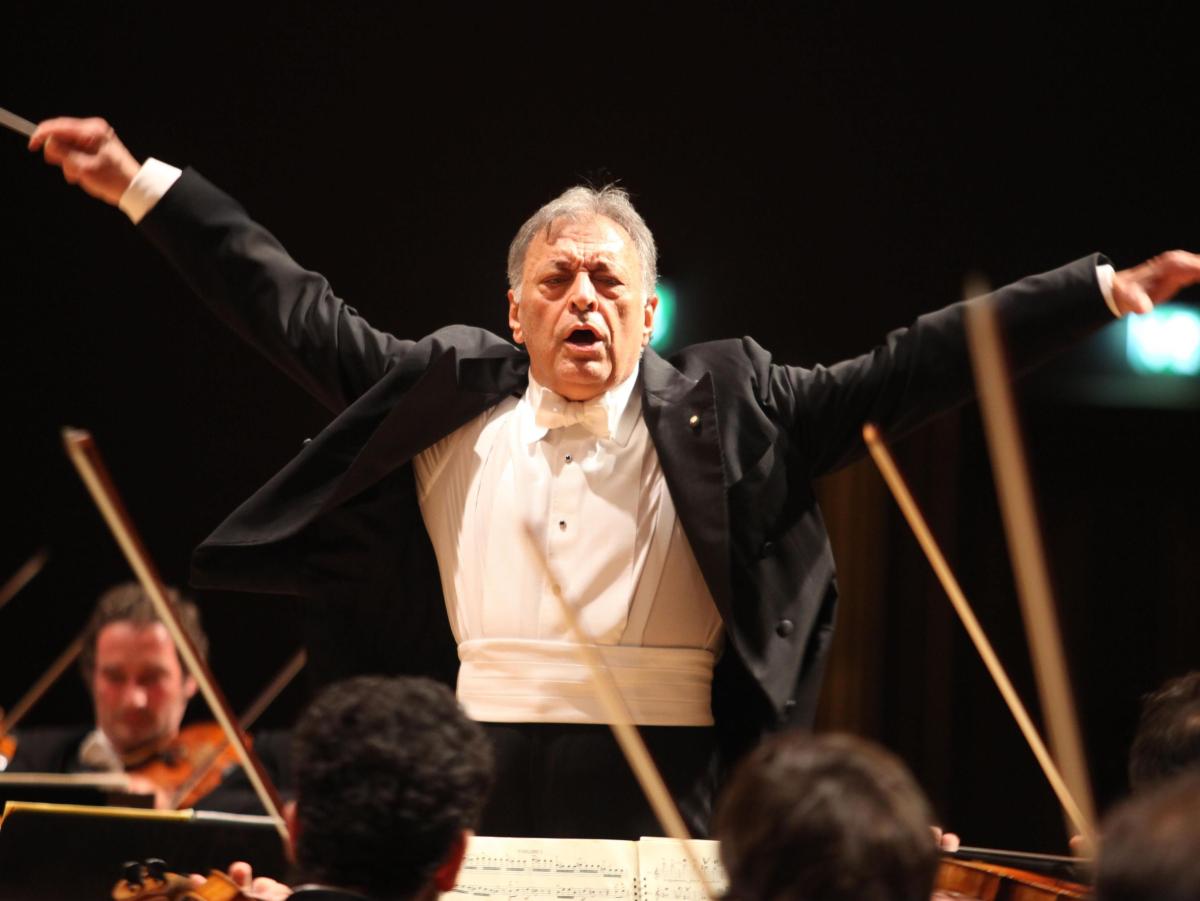Under the baton of the legendary maestro Zubin Mehta, it was anticipated that this constellation of Australian stars would produce something very special indeed. Without wishing to labour the metaphor unduly, brilliant, shining and other celestial adjectives were inevitably conjured up by the performance given by the Australian World Orchestra (AWO) on Wednesday night.
The AWO’s inaugural concert in 2011 was greeted with ecstatic reviews, so expectations were high for the second series of concerts, especially with such an inspiring conductor at the helm. Despite the virtuosity of the more than 110 of Australia’s finest classical musicians, drawn from over 47 of the world’s greatest orchestras, it is no mean feat to have them work as an integrated orchestral instrument. Considering the positions held by so many of the musicians, things have the potential to become quite competitive. As principal players in so many different orchestras, would it be a case of too many chefs? Happily, such is the atmosphere of collegiality and the over-riding focus of all concerned on producing the best possible product, that egos are totally at the service of the music. Having watched some of the rehearsal sessions, I was struck by the generous way maestro Mehta himself acknowledged excellent work and the musicians applauded each other’s successes.
Being the centenary of the première of The Rite of Spring, audiences and musicians have had the opportunity to hear and play this 20th century masterpiece several times this year. In his pre-concert talk with Michael Shmith, Mehta said that he had already conducted three or four performances. For an audience, rather than detracting from the excitement, familiarity promotes a greater appreciation of the subtleties of such a work. Conducting without a score, as is his practice, Mehta gave his full attention to his players, ensuring that dynamic and rhythmic details were closely observed and that the phrasing and emotional architecture were shaped to maximum effect. Without resorting to any untoward theatrical gestures, his clear, precise beat elicited finely woven strands of wind playing in addition to savage visceral power from the full orchestra. Apart from notable contributions from the woodwind, brass and percussion sections (a special bravo for the timpanist), an outstanding feature of the performance was the power of the lower strings.
A beautifully full string tone, whether in the form of a transparent pianissimo or a luxuriant forte was also a characteristic of this performance of Mahler’s First Symphony. Having immersed himself in the musical culture of Vienna as an 18 year old, including studying the score with the great Bruno Walter, it comes as no surprise that Mehta was in his element with this work. While the Stravinsky was impressive, it was in the Mahler that the greatest satisfactions could be found on Wednesday night. Beginning with the softest pianissimo, the ‘Langsam’ acted as a slow-moving meditation on the evocative powers of orchestral colour. As with the Stravinsky, emphasis was placed on the intricate inter-weaving of voices, in all their clarity and variety, exploring texture and establishing mood. The more exuberant celebrations of nature were given a spirited treatment. While there was the very occasional blurred entry from the horns in this movement, there was a great deal of fine ensemble playing from them and some splendid solo work, especially in the finale. The ‘Blumine (Andante)’, suggestive of flowering or blossoming, is sometimes omitted. Fortunately, it was included as the second movement on this occasion and featured a number of beguilingly played trumpet solos.
This symphony offers an endless stream of delights with its sudden contrasts in mood, swinging from a stamping Ländler to an elegant waltz, from the agony of thwarted passion to the consolation and joys of nature. The AWO rose to the challenge of unfolding them with an abundance of sensitivity and energy, none more so than Diana Doherty, whose oboe solos were a revelation of beauty and musicality. Although she is one of those who have chosen to make her career in Australia, it was plain that her gifts are such that any orchestra would treasure. In fact, there were so many highlights offered by so many virtuoso members of the orchestra, from eloquent featured solo passages to the way chords were exquisitely blended, that it is impossible to acknowledge them all.
The more cynical amongst us might believe that the overseas contingent of musicians could regard this venture as some kind of holiday junket. In fact, for many it involved considerable expense and sacrifice since the northern hemisphere orchestral season had already begun. Some had already had their scheduled break in Australia and were either obliged to stay on or return for a short time. (Certainly, the vagaries of Melbourne’s weather at this time of the year could hardly be an inducement.) The AWO musicians come together because it is a wonderful opportunity to make music of the highest calibre with outstanding colleagues. Anybody looking at the roll call on the program would be astonished to see just what these musicians have achieved – Australians punching well above their weight yet again.
Maestro Mehta referred to them as ‘the best orchestra in the world’. The cheers and standing ovation that greeted the triumphant, life-affirming conclusion of the Mahler symphony appeared to confirm his opinion. We are fortunate indeed to have the opportunity to hear it, thanks to the vision of Artistic Director and Chief Conductor, Alexander Briger, and others involved in realizing such an exciting and inspiring initiative.
Rating: 5 stars out of 5
Australian World OrchestraConductor: Zubin Mehta
Stravinsky – ‘The Rite of Spring’
Mahler – Symphony No. 1 in D Major with the Blumine movement
Hamer Hall, Arts Centre Melbourne
2 October






